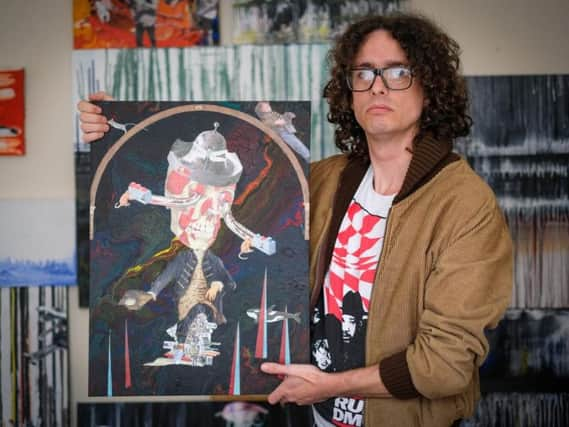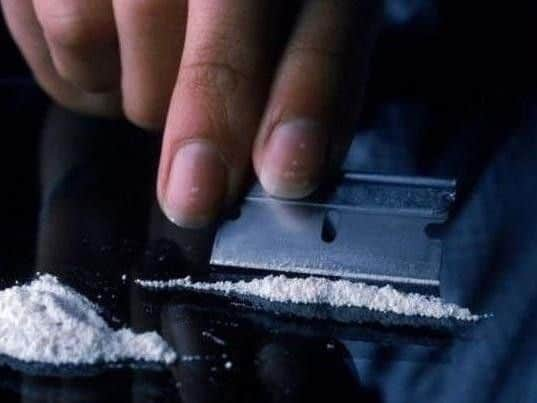‘You'd go to parties and they would bring out a board with the chopped lines of cocaine like they were bringing out the biscuits,' says former Blackpool drug addict


The town has the second highest rate of middle-aged people suffering from cocaine and heroin addiction in the country.
Figures by Public Health England reveal that an estimated 29 in every 1,000 Blackpool people aged between 35 and 64-years-old are hooked on hard drugs.
Advertisement
Hide AdAdvertisement
Hide AdCharities have warned that drug abuse in later life can lead to higher risks of overdosing, as well as other major health issues like lung problems and Hepatitis C.


But Blackpool artist Mathew Jones, who battled the dark scourge of addiction for more than a decade, said it was never too late to get help.
Mathew, 41, fell into drug addiction as a young man growing up in Essex.
During the 90s, he said, it became ‘fashionable’ to take cocaine.
Advertisement
Hide AdAdvertisement
Hide AdHe said: “Like the Gallagher brothers said, it was just like a cup of tea. You’d go to peoples houses for a meal or a dinner part and it would be like bringing out the gateaux at the end.
They’d bring out the board with the lines chopped up. Like bringing out the biscuits.
“They’d ask if you fancied cocaine as if you fancied a cup of coffee.
“Before, cocaine really was quite expensive so the working class lads like me got into it quite late. Cocaine was like the champagne of the drug world. It was about £60 a gram.”
Advertisement
Hide AdAdvertisement
Hide AdMany people who have been taking heroin or crack for decades face a higher risk of overdose or major health problems, according to Steve Moffatt, of alcohol, drugs and mental health charity Addaction.
He said: “These statistics reflect a group of people who started using heroin or crack cocaine in the 1980s and 1990s.
“Many of them have struggled to leave the drugs behind and have had really tough lives. They face higher risks of overdosing alongside health issues like lung problems and Hepatitis C.
“We also know that people who use heroin or crack cocaine are more likely to have an alcohol problem, smoke cigarettes and have poor nutrition.”
Advertisement
Hide AdAdvertisement
Hide AdMathew was hooked on drugs, alcohol and cocaine for years before being sectioned at The Harbour after a mental breakdown in 2017.
He said: “I overdosed a few times, and that always psychologically stays with you,” he said. “Physically, I have had lots of lung issues. My lungs used to collapse quite a bit when I was smoking.
“If you look at heroin under a microscope it looks like pins, very sharp and jagged. That couldn’t have helped much.
“But compared to others. I have got away scot free. A lot of my friends have got major problems with their veins and their lungs.
Advertisement
Hide AdAdvertisement
Hide Ad“A mate of mine who is around my age had been using heroin for years and years, and his hands are twice the size they should be because of the needles.”
Mathew now lives at the Mulberry Project in Blackpool with three other former drug users in their 40s and 50s.
The project was set up to provide housing for those in recovery from alcohol drug misuse.
With the help of mental health staff and the support of others like him, Mathew has now been sober for two-and-a-half years.
Advertisement
Hide AdAdvertisement
Hide AdHe is studying art A-level course at Blackpool and The Fylde College, while also putting paintbrush to paper and creating his own abstract art based on the rocky road to recovery.
His first solo art exhibition, ‘Art Saved My Life’, opened at Shaws Cafe on Clifton Street in April last year.
He has another exhibition planned for this summer.
“This is the longest I have ever been sober,” he said.
“I had been trying to get sober for 15 years. I got into recovery when I was 27, but I never really got more than a year. After that the longest was six months.
“I’m trying the repair the wreckage of my past. But there’s a lot of positive things.
Advertisement
Hide AdAdvertisement
Hide Ad“Two-and-a-half years ago I was getting psychosis, depression and suicidal thoughts. I was in the Harbour for quite a while and that was an amazing experience, and I’m very grateful for the help that they gave me.
“Without that help I wouldn’t be able to have got onto the path I’m on now.
“The Mulberry Project has a very supportive environment. We all help each other, share our experiences of what happened to us and what we are doing to help overcome that.
“We are all from different walks of life. Some come straight from prison, some from psychiatric wards, some have been kicked out and some are homeless.
Advertisement
Hide AdAdvertisement
Hide Ad“It’s a very loving place and a very nurturing place. We help each other and support each other.
“I would say to drug users that recovery is possible. I had resigned myself to this life. I thought this is my life, and this is how I am going to die. But there’s lots and lots of help out there, which I don’t think they realise.
“Blackpool is absolutely blessed with support groups, recovery groups and places you can go for meetings three times a day.
“Reach out and get that help. Don’t be afraid, because everyone has been there once. We all have our first meeting.
Advertisement
Hide AdAdvertisement
Hide Ad“I’m not living in a prison any more. Drugs don’t dictate me.
“I’m going to challenge myself and I’m trying to help others like someone helped me, and keep the loop going.
“My life is completely different now. It’s not perfect. I’d like to see my sons. But today I have something to look forward to.”
Mr Moffatt added: “We can’t be fatalistic about this group - and we need to do better.
“People can make a change at any point in their lives if we make sure we’re there for them with the right kind of support.”